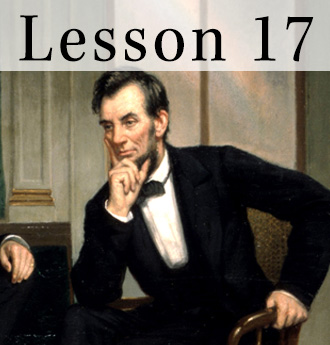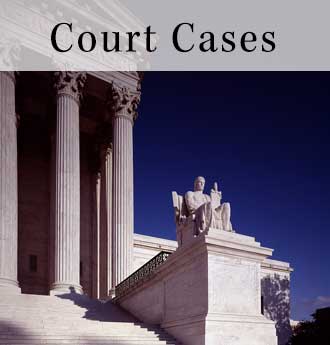Lesson 17: How Did the Civil War Test and Transform the American Constitutional System?
What constitutional issues were raised by the Civil War and how were they resolved? (Video)
Constitutional issues raised by the Civil War, e.g., a union of states or of people, nullification, secession, national supremacy; states' rights and slavery; Thirteenth Amendment; Fourteenth Amendment; Dred Scott decision; compromises over slavery in the Constitution including fugitive slave provisions and the Three-Fifths Compromise; Virginia's dominance in the Electoral College and its effects on the White House.
Student Questions: Unit 3, Lesson 17, Sections 1-5 (pdf download)
Image credits: The Peacemakers by George Peter Alexander Healy, 1868, Wikimedia Commons/The White House Historical Association; Slaves of General Thomas F. Drayton by Henry P. Moore, 1862, Wikimedia Commons; Dred Scott by Paul Sableman (cropped), 2015, Flickr/Paul Sableman/CC BY 2.0.
What evidence is there that the Framers thought slavery might end in the years after the Philadelphia Convention? (Video)
The Constitution and slavery; regulation of the importation of labor; compromises between North and South instead of large and small states; scope and limits of Congressional power over slavery: regulation of domestic and international commerce, the power to make rules for the territories; Missouri Compromise; impact of Dred Scott decision; Thirteenth Amendment; accommodation of slavery through the Three-Fifths Compromise and the Electoral College.
Image credits: United States map with Missouri Compromise Line by Julio Reis, 2009, Wikimedia Commons/CC BY-SA 3.0
What were the central arguments for and against succession and how were they justified? (Video)
Justifications for and against secession; location of sovereignty; sovereignty refers to people of states or nation; impact of Lincoln's election; similarities and differences between U.S. Constitution and the Constitution of the Confederate States of America.
Image credits: Abraham Lincoln looking straight into the camera by William Marsh, modified by Scewing, 1860, Wikimedia Commons
Which of Lincoln's actions during the Civil War appear constitutionally justifiable or not constitutionally justifiable? (Video)
Constitutionality of Lincoln's actions during the Civil War, such as the blockade of southern ports, Emancipation Proclamation, suspension of writ of habeas corpus, and punishment of political dissenters; Congressional approval of Lincoln's actions; the justification of the Emancipation Proclamation.
Image credits: USS Powhatan (1850), 2016, Flickr/Mike Goad/National Archives.
What constitutional issues were resolved by the Civil War? How effective were the Thirteenth, Fourteenth, and Fifteenth Amendments in protecting the rights of African Americans? (Video)
The constitutional issues resolved by Civil War include slavery, states' rights and secession, location of sovereignty, and citizenship; Fourteenth Amendment; key provisions of Thirteenth, Fourteenth, and Fifteenth Amendments; complexity of Fourteenth Amendment clauses, i.e., Privileges and Immunities Clause, Due Process Clause, and Equal Protection Clause; post-Reconstruction; Jim Crow and segregation; disenfranchisement of African American men.
Sound Smart: Dred Scott Case (Video)
A rundown of the story of Dred Scott and his case that went to the Supreme Court.
Eric Foner on the Abolition Movement (Video)
Eric Foner talks about the Abolition Movement in an interview.
Slavery (Video)
A video about slavery and its role in the succession of the union by Annenberg Media.
The Coming of the Civil War (Video)
A video describing the events that led to the Civil War by Annenberg Media.
The Civil War (Video)
Civil War video by Annenberg Media.
Reconstruction (Video)
A video about Reconstruction from Annenberg Media.
Lincoln (Video)
Allen Guelzo lectures on Lincoln's Emancipation Proclamation.
Lincoln: A Life of Purpose and Power (Video)
Richard Cowardine lectures on the life of Abraham Lincoln.








